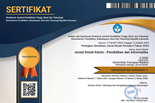Pengembangan Game Edukasi Berbasis Android PADA Materi Jenis Konektivitas Internet Kelas X TKJ SMKN 1 Sepulu
Abstract
The development of technology in the world of education can produce learning innovations, one of which is educational games. This study aims to develop an Android-based educational game application as a learning medium on the material of internet connectivity types for class X TKJ students at SMKN 1 Sepulu. This study uses the Research and Development (R&D) method with the ADDIE development model consisting of five stages: analysis, design, development, implementation, and evaluation. The results of the study indicate that this educational game application has succeeded in increasing the effectiveness of learning through validation testing and user trials. Validation by media experts obtained a percentage of 96.3% and material experts 98.4%, both in the "very good" category. User trials involving students were carried out in three stages, namely individual trials 95.7%, small groups 96.0%, and large groups 90.7%, all in the "very good" category. With these results, this Android-based educational game application is considered suitable for use as a learning medium to increase student motivation and learning outcomes. This study shows that the development of educational game-based learning media can be an innovative solution to support more interesting and effective learning.
Keywords
Full Text:
PDFReferences
Amalia, B., & Dikananda, A. R. (2023). PENGEMBANGAN GAME EDUKASI UNTUK MENGENALKAN JENIS PROFESI PADA ANAK TK DENGAN MENGGUNAKAN METODE ADDIE DI PAUD KAYUWALANG YAYASAN AL-MUTAQIN. JATI (Jurnal Mahasiswa Teknik Informatika), 7(1), 615–618.
Hasan, M., Milawati, Darodjat, Khairani, H., & Tahrim, T. (2021). Media Pembelajaran. In Tahta Media Group.
Hellyana, C. M., Fadlilah, N. I., Wijianto, R., & Ade Putra, K. A. (2023). Game Edukasi “Perjalanan Si Koko” Sebagai Media Pembelajaran. Informatics and Computer Engineering Journal, 3(1), 88–96. https://doi.org/10.31294/icej.v3i1.1784
Hidayat, F., & Muhamad, N. (2021). Model Addie (Analysis, Design, Development, Implementation and Evaluation) Dalam Pembelajaran Pendidikan Agama Islam Addie (Analysis, Design, Development, Implementation and Evaluation) Model in Islamic Education Learning. J. Inov. Pendidik. Agama Islam, 1(1), 28–37.
Mawarni, J., & Hendriyani, Y. (2021). Pengembangan Media Pembelajaran E-Modul Interaktif Pada Matakuliah Pemrograman Visual Dengan Metode Pengembangan Addie. Jurnal Vokasi Informatika, 79–88.
Nurisa, K., & Ghofur, M. A. (2019). Pengembangan Media Pembelajaran Game Edukasi Berbasis Android Pada Mata Pelajaran Ekonomi Kelas X Ips Sma Negeri 1 Bangkalan. Jurnal Pendidikan Ekonomi (JUPE), 7(2), 38–43.
Prabowo, I. A., Wijayanto, H., Yudanto, B. W., & Nugroho, S. (2021). Buku Ajar: Pemrograman Mobile Berbasis Android (teori, latihan dan tugas mandiri). Lembaga Penelitian dan Pengabdian pada Masyarakat Universitas Dian Nuswantoro.
Purnama, R. (2021). Perancangan Aplikasi Game Petualangan Si Unyil Berbasis Android Menggunakan Metode Finite State Mechine. Jurnal Dunia Ilmu, 1(1).
Sephiana, N., Cahyani, L., Tahir, M., Dellia, P., & Aisyiah, J. (2022). Sistem Informasi Wisata Kuliner sebagai Referensi Pengenalan Objek Wisata Madura Berbasis Website. Jurnal Ilmiah Edutic: Pendidikan Dan Informatika, 9(1), 29–39.
Sugiyono, P. D. (2013). Metode Penelitian Kuantitatif, Kualitatif, dan R&D. Alfabeta.
Suryani, N., Setiawan, A., & Putria, A. (2018). Media pembelajaran inovatif dan pengembangannya.
Utama, N., Ade Darman, R., & Nurdin, B. (2024). Pengembangan Media Pembelajaran Berbasis Game Edukasi Pada Mata Pelajaran Informatika Kelas X Tjkt Smk Negeri 1 Sintuk Toboh Gadang. JATI (Jurnal Mahasiswa Teknik Informatika), 7(5), 3475–3483. https://doi.org/10.36040/jati.v7i5.7684
DOI: https://doi.org/10.21107/edutic.v11i1.28152
Refbacks
- There are currently no refbacks.
Copyright (c) 2024 Luluk Mauli Diana, Ana Yuniasti Retno Wulandari, Alfina Kusuma Nilasari

This work is licensed under a Creative Commons Attribution 4.0 International License.
Indexed by:
 J. Ilm. Edutic is licensed under a Creative Commons Attribution 4.0 International License.
J. Ilm. Edutic is licensed under a Creative Commons Attribution 4.0 International License.















